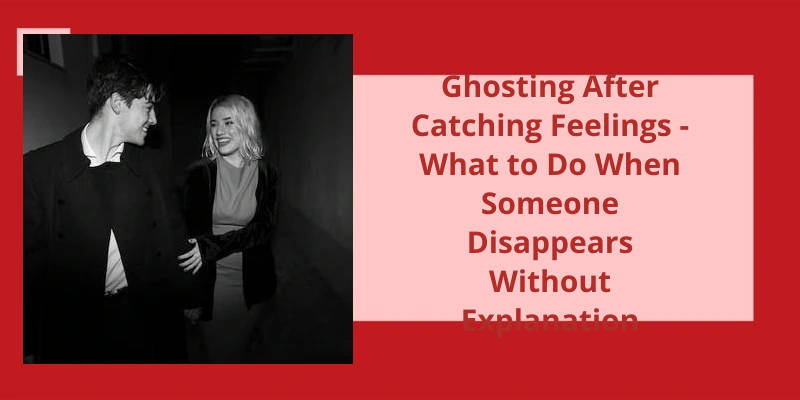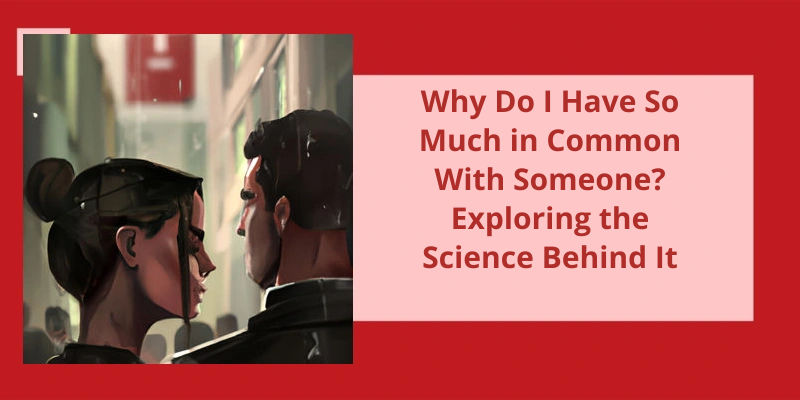Ghosting after catching feelings can be a confusing and painful experience that leaves individuals wondering why someone they’d a connection with suddenly disappears without explanation. There are several potential reasons why this phenomenon occurs, and understanding them can help shed some light on this distressing situation. One expert suggests that some individuals may ghost because they find themselves overwhelmed by the intensity of their feelings and lack the emotional coping mechanisms to navigate them. In such cases, they may choose to withdraw and disappear as a means of self-preservation. On the other hand, another expert suggests that men specifically may ghost on a woman once feelings start to develop because they may not be ready or willing to provide the level of commitment or emotional investment that the other person desires.
Why Do Girls Ghost After Hooking Up?
Ghosting can be a frustrating experience, especially when it occurs after hooking up with someone. While it may seem unfair and hurtful, it’s essential to understand that there are many possible reasons why someone might choose to ghost. It’s crucial not to blame yourself and instead focus on your own well-being.
Chemistry and compatibility are subjective, and even though you may have had a good time together, they may haven’t felt the same way. This lack of emotional connection could have led them to choose to disappear without explanation.
Another possibility is that the person was only looking for a casual relationship or a one-night stand. They may not have been interested in pursuing anything further, and rather than expressing this directly, they opted for ghosting. Although this can be disappointing, it’s important to remember that not everyone is seeking a committed or long-term relationship.
They may be dealing with emotional baggage, stress, or other challenges that prevent them from engaging in a relationship or even maintaining communication. While it may not be fair to you, it’s essential to recognize that their disappearance may have nothing to do with you personally.
It’s their choice, and dwelling on it will only bring unnecessary pain. Instead, focus on your own emotional well-being and surround yourself with supportive friends and family who can provide the comfort and reassurance you may need during this difficult time.
Remember, ghosting says more about the other person than it does about you. Dont take it as a reflection of your worth or desirability. Instead, use the experience as an opportunity to grow and learn about what you truly want and deserve in a relationship. While it may be challenging at first, with time, you’ll heal and move forward, ready to find someone who appreciates and values you.
The Psychology Behind Ghosting in General, Not Just After Hooking Up.
Ghosting is a phenomenon where someone abruptly cuts off all communication and disappears without any explanation or closure. It can happen in various contexts, not just after hooking up. The psychology behind ghosting often revolves around avoidance, fear of confrontation, and emotional immaturity. People may choose to ghost because they’re unable or unwilling to express their true feelings or face potential conflict. This behavior can leave the person who’s been ghosted feeling confused, hurt, and rejected, as they’re left without any answers or understanding. Additionally, ghosting can also reflect a lack of empathy and consideration for the other person’s emotions. Ultimately, it’s important to remember that ghosting says more about the person doing it than the one being ghosted, and it’s crucial to prioritize self-care and moving on when faced with ghosting.
When ghosting someone, individuals often experience a mix of emotions, such as guilt, shame, or remorse, as they abruptly end a relationship without providing any explanation. The act of ghosting is typically driven by a strong desire to avoid confrontation, uncomfortable conversations, or potential conflicts.
What Emotions Do Ghosters Feel When They Ghost Someone?
Ghosting is a commonly acknowledged phenomenon in the realm of modern dating, but it’s still riddled with questions and uncertainties. While the focus is often on the emotions experienced by the person who’s been ghosted, little attention is paid to the emotional state of the ghoster. It’s important to understand that ghosters too experience complex emotions when they choose to abruptly end a relationship without explanation.
One of the primary emotions that ghosters may feel is guilt. They may recognize that their actions have caused pain and confusion to the person they’ve ghosted. This guilt can weigh heavily on their conscience and can be difficult to shake off. Similarly, shame may also arise as ghosters realize that their behavior doesn’t align with their personal values or the way they want to be perceived by others.
They may genuinely regret their decision to disappear without offering any explanation or closure. This remorse can stem from a place of empathy, as they understand the emotional impact of their actions on the other person involved. It may also arise from a place of self-reflection, as they come to understand the potential damage they’ve caused to their own reputation and future relationships.
The choice to ghost someone is often driven by a strong desire to avoid confrontation, uncomfortable conversations, or potential conflicts. Ghosters may experience anxiety or fear in the face of these situations, leading them to choose the path of least resistance. This aversion to confrontation can create a sense of relief initially, but it’s often followed by a sense of unease and dissatisfaction with their own behavior.
It’s crucial to acknowledge that everyones experience and emotions can vary greatly. However, by understanding the possible emotional landscape of ghosters, we can better comprehend the complexity of human relationships and navigate the aftermath of ghosting with empathy and compassion.
The Thought Process Behind Ghosting: What Factors Influence Someone to Choose Ghosting as a Method of Ending a Relationship?
When someone decides to ghost another person, it’s often influenced by various factors that contribute to their choice of ending a relationship without explanation. These factors may include fear of confrontation, avoidance of uncomfortable conversations, lack of communication skills, or simply not wanting to deal with the emotional consequences of a breakup.
While ghosting a hookup may be seen as an immature approach to ending a relationship, especially when emotional or physical intimacy has been involved, it’s crucial to recognize the negative impact it can have on the other person involved. Dr. Kryss Shane, a licensed social worker, emphasizes that opting for ghosting displays a lack of courage and empathy, putting personal comforts ahead of basic kindness and consideration.
Is It Wrong to Ghost a Hookup?
Is it wrong to ghost a hookup? Ghosting is an immature way to end a relationship, especially if youve put time and energy into the connection, especially physical intimacy. It’s a disrespectful and hurtful act that leaves the other person feeling confused and abandoned. It shows a lack of respect for the other persons feelings and is often seen as a cowardly move.
“Whatever reason, if somebody ghosts, theyre choosing cowardice over kindness,” said Dr. Kryss Shane, LSW, LMSW. It’s important to consider the impact of your actions on someone elses emotional well-being. If you’ve developed a connection with someone, even if it was just a casual hookup, it’s important to treat them with respect and consideration. Ending a relationship, no matter how casual or short-lived, should involve open communication and honesty.
It creates a sense of uncertainty and confusion, as the person on the receiving end is left wondering what they did wrong or why they weren’t worthy of a proper goodbye. It can also lead to negative self-esteem and trust issues in future relationships.
Instead of taking the easy way out, it’s important to have a conversation with the other person, even if it may be uncomfortable. Express your feelings honestly and respectfully. While it may be difficult, it’s a necessary step towards growth and maturity. By ending a relationship in a respectful manner, you’re allowing the other person to have closure and move on without the pain of unanswered questions.
The Potential Consequences of Ghosting for Both Parties Involved
- Feelings of confusion and anxiety for the person who’s been ghosted
- Loss of trust and closure in relationships
- Damaged self-esteem and self-worth for those who’ve been ghosted
- Difficulty in moving on and finding closure
- Potential negative impact on future relationships
- Decreased communication skills and fear of vulnerability
- Increased feelings of loneliness and isolation
- Negative perception of ghosting as a relationship norm
Source: Is it ever acceptable to ‘Ghost’ someone when Online Dating?..
However, there may be instances where someone doesn’t respond to your messages or calls, yet they haven’t completely vanished. In these cases, it may not be considered traditional ghosting, but it can still leave you feeling confused and unsure about where you stand with that person.
Is It Ghosting if They Don T Respond?
Is it ghosting if they don’t respond? The concept of ghosting often implies a complete disappearance, where someone vanishes from your life without any explanation or further communication. However, when someone doesn’t respond, it can create a similar feeling of confusion and frustration. While it may not fit the strict definition of ghosting, the impact can be just as significant, leaving you grappling with unanswered questions and a sense of being left in the dark.
When someone fails to respond, whether it’s after a date, a heartfelt text, or a message seeking clarity, it can leave you feeling perplexed and hurt. You may be left replaying interactions in your mind, wondering what you did wrong or if you misread the situation. The lack of closure can be disorienting and emotionally draining, as you struggle to make sense of the sudden silence.
Unlike traditional ghosting, where the absence is unequivocal, a lack of response can introduce a glimmer of hope, albeit a fading one. You may find yourself holding onto the possibility that theres a valid reason for the silence, that the person is simply caught up in their own life or experiencing a temporary setback. However, as time passes without any explanation, it becomes increasingly difficult to maintain that optimism.
Navigating the aftermath of someone not responding requires resilience and self-care. It’s important to remember that you aren’t at fault for the other persons actions or lack thereof. It’s essential to recognize that their silence is a reflection of them, not of your worth or desirability. Give yourself time to process your emotions and don’t hesitate to seek support from friends or loved ones who can offer perspective and understanding.
In situations like these, it’s crucial to strike a balance between granting space and seeking closure. While it’s tempting to constantly reach out or employ various techniques to force a response, it’s essential to respect the other persons autonomy. However, there may come a point where you need to prioritize your own closure and well-being. In such cases, consider expressing yourself calmly and honestly, explaining how their silence is affecting you and requesting an explanation, if you feel comfortable doing so.
Ultimately, not receiving a response can be incredibly challenging and may leave you with unanswered questions. Remember, though, that you deserve someone who respects you enough to communicate openly and honestly. As painful as it may be, sometimes letting go and moving forward is the best way to honor yourself and open yourself up to new possibilities.
Does Ghosting Say More About Them?
You’ve to keep trying to maintain that connection. It can be incredibly frustrating and hurtful when someone suddenly disappears without any explanation, especially when you’ve developed feelings for them. However, it’s essential to remember that ghosting says more about the person doing it than it does about you.
Ghosting is typically a reflection of someones discomfort or inability to address difficult emotions or confrontations. It may stem from their own fears or insecurities, leading them to choose avoidance rather than providing an explanation. While it’s tempting to internalize the ghosting as a reflection of your worth or value, it’s crucial not to take it personally.
Ultimately, it’s their loss, and you deserve someone who’s willing to communicate openly and honestly. While it may be challenging, resist the urge to reach out and seek closure. Sometimes closure can only come from within, and attempting to chase after an explanation may prolong your own healing process.
Instead, redirect your energy towards self-care and cultivating other relationships that bring you joy and fulfillment. Surround yourself with friends and loved ones who support and appreciate you.
It’s important to trust that the right person won’t disappear without explanation or cause you such pain. Keep trying to find genuine connections and open yourself up to the possibility of love. And remember, ghosting says more about them than you.
However, it’s important to recognize that ghosting isn’t solely a gender-specific behavior. Men can also ghost women they’re interested in for similar reasons. In this article, we will explore the possible motivations behind a girl ghosting someone she likes and provide some insights into this perplexing phenomenon.
Why Would a Girl Ghost Someone She Likes?
When it comes to ghosting, it can be a confusing and frustrating experience for anyone involved. But if you find yourself on the receiving end of a ghosting situation from a girl you thought liked you, there could be a few reasons behind her disappearing act. One possibility is that you simply failed to keep her interested. Perhaps the initial spark fizzled out or you didnt make enough effort to maintain the connection. In this case, she may have felt it was easier to disappear rather than express her waning interest.
Sometimes, unknowingly, you might have given off the impression that you were too eager or dependent on her. This could have caused her to feel overwhelmed or suffocated, leading her to opt for a clean break rather than address the issue directly.
Lastly, it’s important to consider the possibility that she doesn’t see you as someone she wants to date romantically. While this may be disappointing, it’s crucial to respect her decision. In this scenario, she may have chosen to ghost you to avoid an uncomfortable conversation where she’s to express her lack of interest. It may hurt, but it’s important to remember that everyone has their own preferences and it’s not a reflection of your worth.
Ultimately, ghosting is a form of avoidance. It allows someone to avoid confrontation, awkward conversations, and potential conflict. Although it can leave the person being ghosted feeling confused and hurt, it’s their way of dealing with a situation they arent comfortable facing head-on. While it may be frustrating to not receive an explanation or closure, sometimes the best course of action is to accept the situation and move forward.
If you find yourself being ghosted, it’s important to take care of yourself and not dwell on the situation too much. Surround yourself with supportive friends and focus on your own happiness. Remember that someone who ghosts you is likely not someone you want to be with anyway. Dont let it affect your self-esteem or make you question your worth. Keep an open mind and heart, and sooner or later, youll find someone who appreciates and values you for who you are.
How to Handle Being Ghosted and Move On
- Recognize that being ghosted isn’t a reflection of your worth as a person.
- Allow yourself to feel the emotions that come with being ghosted, but don’t dwell on them for too long.
- Acknowledge that closure may not come from the person who ghosted you, and that’s okay.
- Focus on self-care and engaging in activities that bring you joy and fulfillment.
- Surround yourself with supportive friends and family members who can offer encouragement and understanding.
- Consider seeking professional help or talking to a therapist to process your feelings and gain perspective.
- Remember that ghosting is a reflection of the other person’s behavior, not your own.
- Redirect your energy towards personal growth and building a fulfilling life for yourself.
- Don’t let being ghosted define your self-worth or affect your future relationships.
- Use the experience as an opportunity to learn and grow, and to attract healthier relationships in the future.
Conclusion
Experts have offered diverse explanations to shed light on this enigmatic phenomenon. Others propose that men may choose to ghost a woman precisely as they may not be prepared or willing to meet her expectations.






